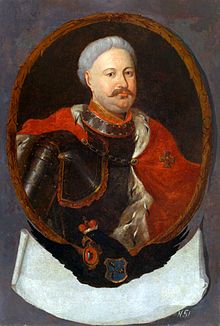Karol Stanisław Radziwiłł (Grand Chancellor)
Prince Karol Stanisław Radziwiłł (Lithuanian Karolis Stanislovas Radvila ) (born November 27, 1669 in Kraków , † August 2, 1719 in Biała Podlaska ) was a magnate of the Radziwill family and Grand Chancellor of Lithuania .
family
He was a son of Michael Kasimir Radziwiłł and the mother Katarzyna Sobieska. He himself married Anna Katarzyna Sanguszko in Vilnius in 1691. The couple had the following offspring: Katarzyna Barbara Radziwiłł, Mikołaj Krzysztof Radziwiłł, Michał Kazimierz Radziwiłł , Konstancja Franciszka Radziwiłł, Karolina Teresa Radziwiłł, Tekla Róża Radziwiłł Elena, Tekla Róża Radziwiła Elena, Tekla Róża Radziwiła Elena Radzi, Radzi Radziłwziła, Albzyiłwziła Radziłwziła, Albzywziła Jérôme, Albzyiłwziła Radziwiłałis, Albzyiłwziłw Hieronim Florian Radziwiłł . His daughter Thekla married the Saxon statesman Jakob Heinrich von Flemming .
Life
He was Deputy Chancellor of Lithuania from 1686 and Grand Chancellor of Lithuania from 1689. He served the king Jan III. Sobieski , who was also his uncle, as a diplomat. Between 1688 and 1689 he took part in the war against the Ottomans . From 1694 he had the Radziwill Palace , today's Polish Presidential Palace, redesigned. After Sobieski's death, he supported the French prince François Louis de Bourbon, prince de Conti, in the 1697 royal election . Ultimately, however, the Elector of Saxony August II prevailed. Radziwill came to terms with the new circumstances and tried to establish working relationships with the new king. He maintained his own means of power and had recruited Huguenot mercenaries, among other things. In 1700 the Lithuanian Reichstag gave him the guardianship of Princess Neuburg. The resulting disputes caused a civil war in Lithuania. After August II had been dethroned in 1706 during the Great Northern War , Radziwill, as the richest magnate, was at times a promising candidate for his successor. Charles XII. of Sweden opted for Stanislaus I. Leszczyński . August II returned to the throne in 1709. The loyal Radziwill ousted the opposition princes Sapieha from power.
He belonged to the order of the white eagle .
literature
- Jerzy Jan Lerski: Historical dictionary of Poland, 966–1945. Westport 1996, p. 463.
Individual evidence
- ↑ Matthew Glozier: Huguenot Soldiers in Russia . In: War, religion and service: Huguenot soldiering, 1685–1713. Burlington 2007, p. 231.
- ^ Chr. Von Stramberg: The bank of the Rhine from Coblenz to Bonn. Vol. 1. Koblenz, 1853 p. 382
| personal data | |
|---|---|
| SURNAME | Radziwiłł, Karol Stanisław |
| ALTERNATIVE NAMES | Radvila, Karolis Stanislovas (Lithuanian) |
| BRIEF DESCRIPTION | Lithuanian nobleman, magnate and grand chancellor |
| DATE OF BIRTH | November 27, 1669 |
| PLACE OF BIRTH | Krakow |
| DATE OF DEATH | August 2, 1719 |
| Place of death | Biała Podlaska |
